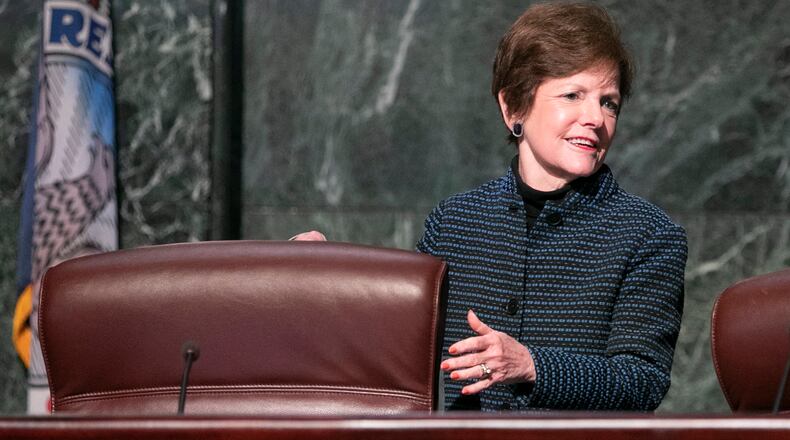Mayor Andre Dickens’ office privately pushed back this week after Mary Norwood — the two-time mayoral candidate who made a return to the Atlanta City Council this year — publicly criticized the city government and accused officials of neglecting Buckhead.
In an opinion piece published on the local political news site Insider Advantage on Tuesday, Norwood wrote that Buckhead “is not getting what we need and deserve.”
She said the movement to create a separate city out of Buckhead — the city’s wealthier and predominantly white Northside — “boils down to many years of Buckhead’s neglect by the city of Atlanta’s government.” She said the condition of Buckhead’s roads, which see heavy commuter and truck traffic, are major concerns among residents.
Dickens was never mentioned by name in the column; Norwood has largely avoided publicly criticizing Dickens’ administration since he took office at the beginning of the year, and some of the concerns in her column can be traced back to previous administrations.
But the mayor’s office nevertheless took issue with her notion that Buckhead doesn’t get its fair share of attention from the city.
The same day Norwood’s column was published, the city’s Chief Operating Officer Lisa Gordon, one of Dickens’ top deputies, sent Norwood a five-page letter in response. In the letter, which was obtained by The Atlanta Journal-Constitution, Gordon wrote that several of Norwood’s points “lacked context or accuracy.”
According to Gordon, she met with Norwood a week ago to discuss traffic concerns in Buckhead, and agreed to respond by the end of this week.
“I regret that you did not share these other concerns at that time before publishing this article,” Gordon wrote.
She responded to several of Norwood’s points, including the councilwoman’s desire for a five-year “Capital Plan” specific to District 8, a traffic plan for the district, Dickens’ housing agenda and infrastructure improvements that are on the horizon for Buckhead.
Gordon also pointed out the city’s public safety investments in Buckhead, including a new police mini-precinct in Buckhead Village. Overall serious crime is also down 10% in Buckhead’s Zone 2 this year compared to this time last year, despite a slight uptick in crime citywide, according to Atlanta police.
The mayor’s office declined to comment further on the issue Wednesday.
In an interview Wednesday, Norwood said she had previously met with members of Dickens’ team on multiple occasions, and published the column to educate her constituents about her concerns.
“There has been a lot of talk about public safety, but public safety is not the only issue that my council district is facing,” said Norwood, whose district covers half of Buckhead. She said she is still seeking more specifics about when certain streets will be repaved and looks forward to working with the Dickens administration to tackle traffic issues. She said Dickens “has done a great job in working hard for the whole city.”
“What I wrote was to just let our city government and the entire community … know that there’s more to it. These are just basic city services,” Norwood said.
The sentiment that the city neglects Buckhead is a frequent refrain within the Buckhead cityhood movement, which was stalled by the state Legislature earlier this year. Norwood’s article was heralded by Bill White, the controversial leader of the cityhood push.
“Preach!”, White wrote on Twitter, reposting Norwood’s article. The councilwoman has stayed neutral on the divisive cityhood issue since taking office.
Norwood wrote that if Atlanta “wants to forestall the creation of a separate city, it should focus on the same thing that I, as a City Council member, am focused on: the delivery of services to my constituents.”
In her response, Gordon also revealed that Norwood proposed using campaign dollars to fund a traffic study for her district after the Atlanta Regional Commission denied the city’s request for a grant. Gordon said that idea “potentially violated the City’s ethics code and could possibly violate campaign finance laws.”
Norwood told the AJC that she believes it would be legal to use campaign money to pay for the traffic plan, but she plans to meet with the city attorney, her personal attorney and the city’s ethics office to make sure she’s following the law.
About the Author
Keep Reading
The Latest
Featured



